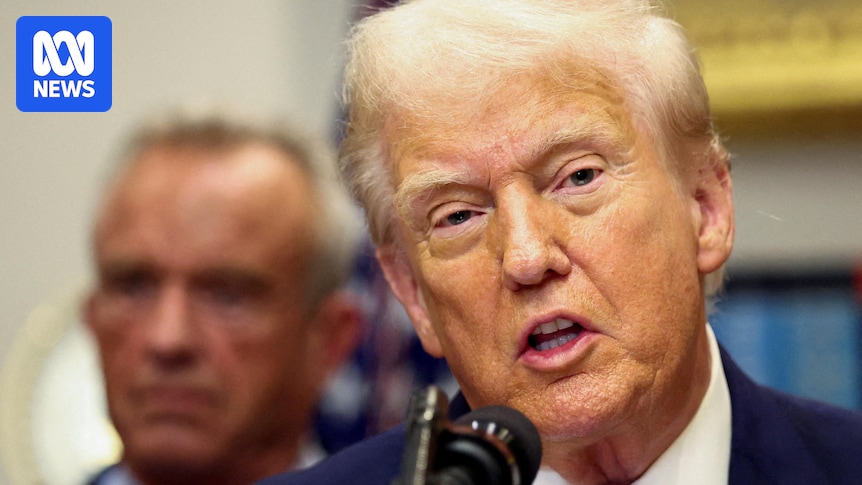For many autistic people, their autism is part of their identity.
It’s the way their brains work, and how they perceive and process the world.
Many autistic people are also very proud of it.
But today, US President Donald Trump’s false linking of autism to paracetamol use during pregnancy and his depiction of the condition as something inherently negative was deeply objectionable to many.
For them, hearing their source of pride being talked about by the most powerful man in the world and his administration as an “epidemic”, puts decades of work towards acceptance and recognition at risk.
A ‘terrifying’ notion
Every autistic person is different, with a wide variety of abilities, support needs, and perspectives on their neurodiversity.
An estimated 290,000 Australians have an autism diagnosis, though the true number of autistic people is thought to be much higher.
A diagnosis can be validating. It can help explain to someone why they experience the world the way they do.
Many have fought against systems and stigma that have tried to change their unique behaviours or put them in boxes they’d never fit into.
Jac den Houting says the comments raise familiar alarm bells. (ABC News: Evan Young)
For Jac den Houting, an autistic research fellow at La Trobe University’s Olga Tennison Autism Research Centre, conversations about the origins of autism can be problematic.
“In science and in medicine, generally if we are looking for the cause of something, it’s because we want to be able to prevent that something from happening in the future,” they say.
That, den Houting says, is “confronting” and “terrifying”.
“The majority of the autistic community isn’t interested in being prevented,” they say.
“Our community, which we’ve worked so hard to develop and foster over the last few decades, the thought of that community just slowly ceasing to exist over time, it’s really quite heart-wrenching.”
Heidi La Paglia, an autistic disability advocate, agreed public, medicalised conversations that focus on how to “fix” autism could be damaging for the community, which already experiences much worse health, mental health, life expectancy, employment and education outcomes than the rest of society.
The statsAutistic people are 2.5 times more likely to experience depression than the general population;Two to three times more likely to die prematurely than the general populationSix times more likely to be unemployed than people without disability69 per cent of autistic 5- to 20-year-olds have experienced difficulty at school or university5 per cent of autistic people have a bachelor degree or higher, compared with 20 per cent of people with disability and 35 per cent of people without disability
Source: National Autism Strategy
“A lot of individuals … are not only exhausted, but really personally hurt when these kind of statements come out, because we’ve had to do so much work to, not only understand ourselves, but also be accepting of our differences.”
La Paglia, herself a parent, also worries mothers are being unfairly blamed for inducing autism in their babies.
“Women have been blamed for literally everything in their children, from disability to mental health conditions to allergies, to anything you can possibly name — and this just seems to be another example of that,” she said.
‘Risk going back decades’
This all comes at a time where the autistic community in Australia is already on-edge.
Last month, the government announced plans to gradually divert children with “mild to moderate” autism and developmental delay away from the NDIS to a new, yet-to-be-designed program called Thriving Kids.
The main driver for the move was to ease the growth of the scheme, which is expected to reach $52 billion this financial year.
While the government might not have intended it that way, many families and advocates read it as a signal autistic kids are a burden on taxpayers.
“We’re very much being framed as this problem that needs to be fixed or solved rather than being talked about as people who just need support to be included in a world that wasn’t built for us, and as people who are proud of who we are,” LaPaglia said.
One of the biggest myths about autistic people — and why it isn’t true
That pride can take years to find, regardless of what disability you have.
Part of why it takes so long is because society tells us to believe we shouldn’t be happy or comfortable being disabled.
But the progress in recent years, particularly for autistic people, has been huge.
Discussions around inclusion and awareness have increased significantly, more public spaces and events cater for sensory needs, Australia has its first autism strategy and South Australia has even introduced a dedicated minister for autism in state parliament.
In our roles as reporters, we’ve also noticed more people than ever feeling comfortable to openly identify as autistic and communicate what they need to thrive.
Loading…
Many people won’t take Trump’s claims overly seriously given he’s consistently at odds with the scientific community and famously once suggested that injecting bleach could help people protect against COVID-19.
But others will take him seriously — or at least be left with doubts about the scientific facts — and that is only going to add to the noise around autism and make it harder for the community to feel understood and accepted.
“We already struggle … to feel like we belong and like we have value. This is the last thing the autistic community needs to be dealing with,” den Houting said.
“We’re at risk of going back decades in the space of days.”
Nobody’s arguing it’s not worth looking into the possible causes of autism.
But when we’re talking about an already vulnerable community, for many of them, the tone and focus of those conversations matter.

